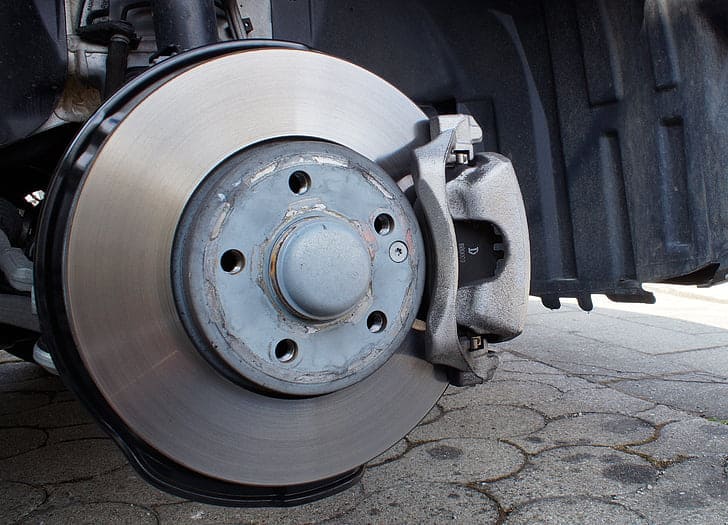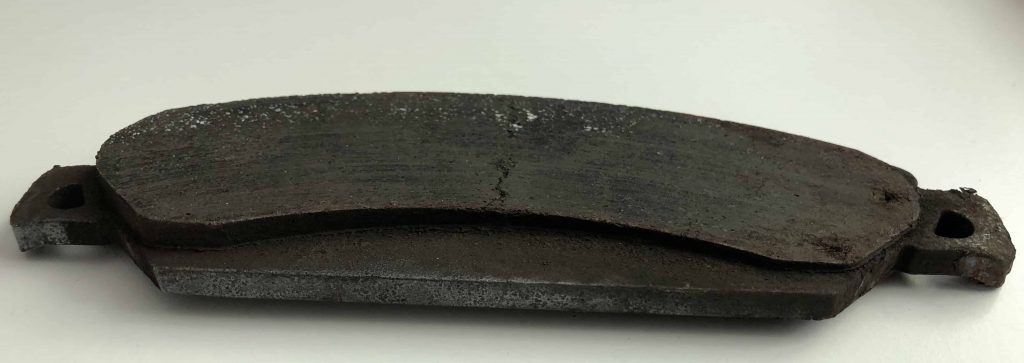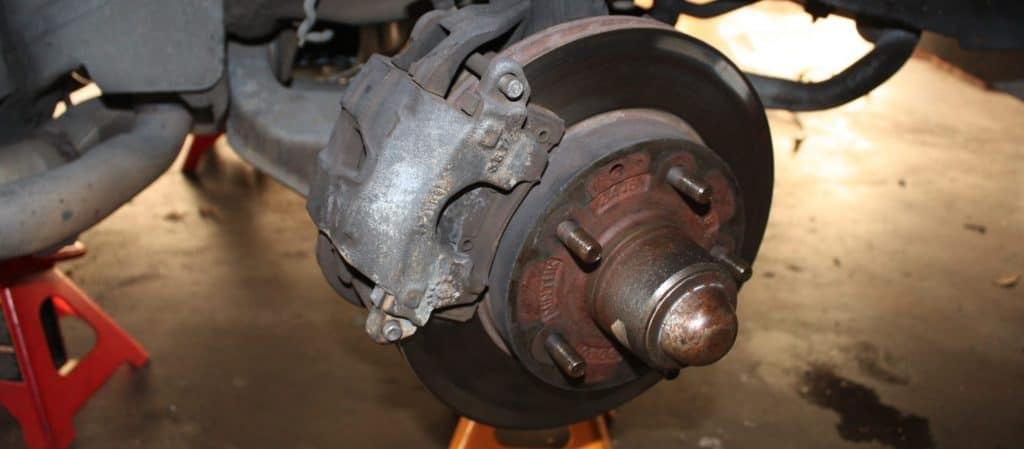You’re cruising along in reverse, and suddenly your car sounds like a rusty door hinge. What gives?
Squeaky brakes during backup are more common than you might think.
The most frequent causes are worn brake pads, dust or debris trapped in the brake system, or misaligned brake components.

Don’t panic just yet – that squeal doesn’t always mean a hefty repair bill.
Sometimes it’s as simple as a bit of moisture on the pads after a rainy day. Or maybe your ride picked up some road grit that’s now playing an unwanted symphony between your pads and rotors.
Remember, your brakes work differently in reverse.
Those wear patterns that develop from normal forward braking can create quite the ruckus when you’re backing up. It’s like trying to moonwalk in sneakers designed for running forward – things just don’t glide as smoothly.
Key Takeaways
- Brake squeaks when reversing are often due to worn pads, debris, or misalignment
- Regular brake maintenance can prevent most squeaking issues
- Professional inspection is recommended if squeaking persists or worsens
Understanding Brake Basics
Brakes are more than just pedals and pads. They’re a complex system that keeps you safe on the road.
Let’s dive into the nitty-gritty of what makes your brakes tick.
Components of the Brake System
Your brake system is like a well-orchestrated band. The star players? Brake pads, rotors, and calipers.
Think of brake pads as the lead singer – they do the heavy lifting when it comes to stopping your car.
The rotors are like the drummer, providing a smooth surface for the pads to grip. Calipers? They’re the bass player, holding everything together and applying pressure where it’s needed.
For some cars, especially older models, you might find drum brakes instead of disc brakes. These work differently but achieve the same goal – stopping your car safely.
Remember, each part plays a crucial role. If one’s out of tune, your whole brake system might start singing the blues!
Role of Lubrication in Brake Function
Now, you might think brakes and lubrication don’t mix. But you’d be surprised!
Proper lubrication is like the secret sauce in your brake recipe.
Certain brake parts need a bit of grease to function smoothly. It’s not about making things slippery – it’s about reducing wear and tear.
Think of it like oiling a squeaky door hinge. The right lube in the right spots can help prevent that annoying squeak when you back up.
But remember, too much of a good thing can be bad.
Over-lubrication can lead to slipping and reduced brake performance. It’s all about finding that Goldilocks zone – not too much, not too little, but just right.
Common Culprits of Brake Squeaks

That annoying squeak when you back up your car can drive you nuts. Let’s dig into the usual suspects behind this automotive orchestra and how you can silence it.
Brake Pad Issues
Ever heard of a brake pad wear indicator? It’s like a tiny metal tattletale that starts singing when your pads are getting thin.
If you hear a high-pitched squeal, especially when backing up, your pads might be auditioning for retirement.
But wait, there’s more! Some pads are just chatty by nature. Those “lifetime” pads from big chain shops? They’re often harder than Captain America’s shield and twice as noisy.
Don’t forget about the dust and debris party.
Your brakes can collect more gunk than a vacuum cleaner bag. This debris can cause a symphony of squeaks that would make a mouse jealous.
Rotor Related Noises
Your rotors are like the dance floor for your brake pads. If they’re not smooth, you’re in for a bumpy (and noisy) ride. Rusted rotors are particularly problematic. They’re like the crusty bread of the brake world – hard on the outside and prone to making a racket.
Warped rotors can also cause a ruckus. They’re like that one wobbly wheel on your shopping cart, but way more annoying and potentially dangerous.
Remember, rotors wear down over time. If they’re too thin, they might start singing the blues… or more accurately, the squeaks.
Caliper Contributions to Squeaking

Your brake calipers are the strong, silent type – until they’re not.
If they get stuck, they can cause your pads to drag on the rotor. It’s like trying to dance with your partner constantly stepping on your toes.
Rusty caliper slide pins can also be culprits.
They’re supposed to slide smoother than a penguin on ice. When they don’t, your pads can wear unevenly and start squeaking like a rusty gate.
Don’t forget about the brake shoe to backing plate contact points. If these aren’t properly lubricated, they’ll start squeaking faster than you can say “oil can.”
Maintenance Tips to Prevent Squeaky Brakes
Keep those brakes quiet and happy with a little TLC. You’ll be amazed at how a bit of elbow grease and some regular check-ups can keep your ride smoothly stopping without any embarrassing squeals.
Proper Cleaning Techniques
Got a case of the squeakies? Time to roll up your sleeves and give those brakes a bath.
Start by removing the wheels – it’s like undressing your car, but less awkward.
Grab some brake cleaner and spray those rotors down like you’re hosing off a muddy dog.
Don’t forget the calipers and pads – they need love too.
Use a wire brush to scrub off any stubborn gunk. It’s like exfoliating, but for your car. Rinse everything off with more brake cleaner.
Finally, apply a thin layer of brake grease to the back of the pads and any metal-on-metal contact points. It’s like moisturizer for your brakes. Just don’t go overboard – you’re lubricating, not deep-frying.
Regular Brake Inspections
Think of brake inspections as your car’s annual physical.
Pop those wheels off every 12,000 miles or so and take a good look.
Check the pad thickness – if it’s thinner than a slice of cheese, it’s time for new ones.
Examine the rotors for any grooves or uneven wear. They should be smoother than a freshly waxed car. If you spot any issues, don’t ignore them like that weird noise your fridge makes.
Listen for any unusual noises when braking.
If your car sounds like a wounded goose, it’s trying to tell you something. Pay attention to how the brake pedal feels too. If it’s softer than your favorite armchair, you might have air in the lines.
Choosing the Right Brake Components
Picking brake parts is like choosing a spouse – get it wrong, and you’ll regret it for years.
Ceramic brake pads are the quiet type, perfect for daily drivers. They’re like library mice – effective but won’t wake the neighbors.
Semi-metallic pads are the rowdy cousins. They’re great for performance but might be a bit noisy. It’s like choosing between slippers and tap shoes.
Don’t cheap out on rotors. Good ones are smoother than a con artist and will last longer too.
And always replace pads and rotors in pairs – they’re like socks, they work best as a team.
Remember, quality parts might cost more upfront, but they’ll save you headaches (and earaches) down the road. It’s like investing in a good mattress – your future self will thank you.
When to Seek Professional Brake Services
Squeaky brakes during backup can be a real head-scratcher. Sometimes it’s just morning dew, but other times it’s your car’s way of crying for help. Let’s dive into when you should give your trusty mechanic a call.
Interpreting Brake Noises
You know that squeal when you back out of the driveway? It might be your brake pads’ way of waving a white flag.
If the noise persists after a few stops, it’s time to get those ears perked up.
A high-pitched squeal could be your brake pad wear indicator doing its job. It’s like a tiny metal musician that starts playing when your pads are getting thin.
Grinding noises? That’s when you need to hit the panic button. It usually means metal-on-metal contact, and that’s bad news for your wallet.
Signs of Brake Component Wear
Your brakes have more tells than a poker player with a bad hand.
Worn brake pads are the usual suspects, but they’re not the only culprits.
Look out for:
- Vibrations in the brake pedal
- Pulling to one side when braking
- A brake pedal that feels spongy or goes to the floor
If your brake calipers are sticking, you might notice uneven wear on your pads. It’s like one shoe wearing out faster than the other – not good for your wallet or your safety.
The Science Behind the Squeal
Brake squeals aren’t just annoying – they’re a symphony of physics at work. Let’s dive into the nitty-gritty of why your brakes decide to serenade you when you’re backing up.
Understanding Vibrations and Noise
You know that feeling when you scratch a chalkboard? Well, your brakes are doing something similar.
When you hit the brakes, the pads grip the rotor, creating friction. This friction can cause vibrations, which are like tiny earthquakes in your brake system.
Sometimes, these vibrations hit just the right frequency – and bam! You’ve got a squeal that could wake the dead.
It’s like your car decided to take up opera singing, but forgot to take lessons first.
Brake dust can also join the party. This pesky stuff builds up and can act like sandpaper, adding to the chorus of squeaks and squeals.
Environmental Factors Affecting Brakes
Mother Nature loves to mess with your brakes.
Moisture is a real troublemaker here. When you park your car overnight, a thin layer of rust can form on the rotors. In the morning, your first reverse might sound like you’re dragging a rusty nail across a tin roof.
Temperature plays a role too. Cold mornings can make your brakes extra vocal. It’s like they need to warm up their voices before performing.
Dust and debris are the uninvited guests at this brake party. They can get trapped between the pad and rotor, acting like a tiny megaphone for all that squealing.
Lack of lubrication is another culprit. Your brakes need a bit of grease in the right spots, just like how you need your morning coffee to function properly.
Frequently Asked Questions
Squeaky brakes during reverse can be puzzling. Let’s address some common concerns about this noisy nuisance that might be driving you up the wall.
How can I quiet my brakes when reversing?
You can try a few tricks to hush those chatty brakes.
First, give your brake pads a good cleaning. Sometimes, a bit of grime is all it takes to turn your car into a squeaky toy.
If that doesn’t do the trick, consider applying a high-temperature lubricant to the back of the brake pads.
It’s like giving your brakes a soothing massage. Just be careful not to get any on the friction surface!
Is it normal for new brakes to emit a squealing noise only in reverse?
New brakes can be drama queens sometimes.
It’s not uncommon for fresh pads to make a fuss, especially when backing up. This is often due to the brake pad material needing to “bed in” with the rotor.
Give it some time and a few forward and reverse trips. If your new brakes are still singing the squeaky song after a week or two, it might be time to have a chat with your mechanic.
What could be causing my brakes to squeak just after I start driving?
Morning squeaks are often caused by a thin layer of rust that forms on your rotors overnight.
It’s like your brakes need their morning coffee too!
This rust usually wears off after a few brake applications. If the squeak persists beyond your morning commute, you might want to check for worn brake pads or other issues.
What are the potential reasons my brakes only squeal when stopping?
Squealing when stopping could be your brakes’ way of sending an SOS.
It often indicates wear on your brake pads. Many pads come with built-in wear indicators that make noise when it’s time for a change.
Other culprits could be debris stuck in your brakes or glazed rotors. Think of it as your car’s way of saying, “Hey, I could use a brake check!”
Why might brakes make a squeaking noise in reverse in cold conditions?
Cold weather can turn your brakes into grumpy old men.
The metal components contract in the cold, which can cause gaps and vibrations that lead to squeaks.
Moisture can also accumulate on the brake components in cold weather, creating a thin layer of ice. As you back up, this ice breaks and causes that lovely morning squeak-serenade.
Is there a reason my brakes would squeak in wet conditions but only when backing up?
Wet brakes can be as unpredictable as a cat in a bathtub.
When you’re moving forward, the motion helps clear water from your brakes. But when backing up, water can get trapped between the pads and rotors.
This trapped moisture creates a thin film that causes squeaking.
It’s like your brakes are complaining about getting their feet wet. Usually, this squeak will disappear once your brakes dry out.
